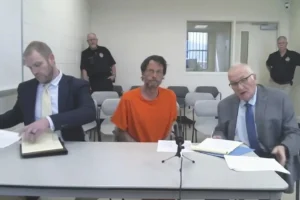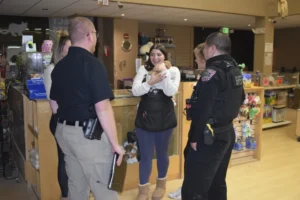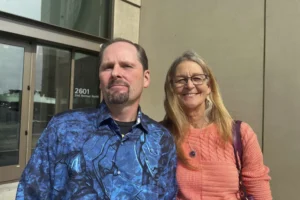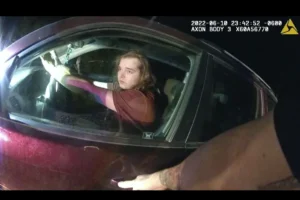Former Residents Suing Ranch for Troubled Teens Hope Court Case Can Proceed as a Class-Action Lawsuit
Attorney says court case could impact human trafficking law
- Published In: Criminal Justice
- Last Updated: Nov 15, 2022
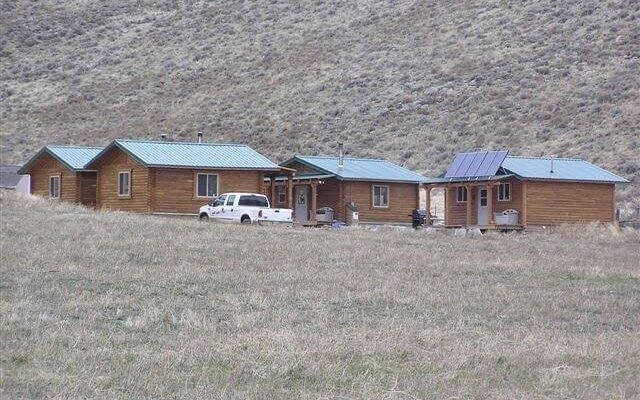
Pictured above are cabins at the Trinity Teen Solutions, which is described as a residential treatment facility for girls in Powell, Wyoming. Google lists the facility as “permanently closed.” Ranch owners are being sued for allegedly abusing and human trafficking residents. (Courtesy photo from the Trinity Teen Solutions’ website)
This story has been updated from a previous version.
Former residents of a rehabilitation ranch for troubled teens that is facing abuse accusations have asked a Wyoming district court to stay court proceedings until an appeals court rules whether to allow their case against the facility to proceed as a class-action lawsuit.
Three plaintiffs — Anna Gozun, Carlie Sherman and Amanda Nash — are trying to sue Trinity Teen Solutions, which described itself as a residential treatment center for struggling teen girls, on allegations of abuse, human trafficking and lack of proper hygiene. On Nov. 8, the plaintiffs filed a motion to stay proceedings pending appeal in the U.S. District Court of Wyoming, arguing that plaintiffs are likely to “succeed on the merits of their appeal” or that the U.S. Court of Appeals for the Tenth Circuit will at least accept the plaintiffs’ appeal.
The plaintiffs assert in the lawsuit that the ranch in Powell, a rural town in northwest Wyoming, threatened them with food and sleep deprivation, imposed physical punishment and emotional abuse such as being leashed to other girls or farm animals and forced them to work without pay for extended periods of time, as well as partake in hard labor that included birthing livestock and repairing barbed wire fencing.
“The thing is, what we were subjected to at Trinity was no ordinary ‘ranch work,’” Gozun, who lived at the ranch from February 2012 to June 2012, told the Wyoming Truth. “We were under the constant threat of punitive punishment and could not rest when sleep deprived, injured or sick. It came before our education, sleep or even meals at times. Not only were they using us for excessive labor without pay, they were taking upwards of $7,500 per month from our parents for ‘therapy.’”

The plaintiffs filed for an appeal on Oct. 19 following a district court judge’s Oct. 5 decision to deny their motion for class certification of their case, meaning the district court ruled the case should proceed as individual lawsuits. The plaintiffs have asked the Tenth Circuit Court to reverse the district court’s ruling.
“The judge’s reasoning was in part that there were specific factual questions about parental consent,” Brice Timmons, an attorney with Donati Law in Memphis, Tenn., who is representing the plaintiffs, said about the district court judge’s ruling against granting class certification. “We have filed a petition to appeal that ruling to the Tenth Circuit Court of Appeals, in part arguing that a parent cannot consent to the forced labor of children.”
He added that his clients asked the court to stay the proceedings because they want the lawsuit to proceed as a class-action lawsuit.
“They’ve made very clear their desire to get justice for all women and girls affected by the defendants in this case, not just for themselves,” Timmons said. “So, in a class-action lawsuit, the court defines a group of people that the plaintiffs can represent, can stand in for, so that not every one of them has to bring their own individual lawsuit.”
Rulings on the motion to stay proceedings and the plaintiffs’ appeal are both pending.
Over 200 girls and women were potentially subjected to abuse at Trinity Teen Solutions, according to Timmons. About 130 girls and women who attended the Christian-based ranch for troubled teens, which is owned by Angie and Jerry Woodward and promised to offer evidence-based treatment and therapy, have contacted Timmons. Around 100 of them were within the 10-year statute of limitations, while 80 have expressed a desire to participate in some type of litigation against the facility and its owners. An estimated 35 women have submitted declarations or affidavits in support of having the case proceed as a class-action lawsuit, Timmons noted.

“There are many survivors of Trinity Teen Solutions – all of which deserve justice and to have their voices heard,” Gozun said. “The Woodwards need to be held accountable. The state of Wyoming has done nothing substantial to protect children from their abuses for decades now. We had to do something. Becoming a mother myself, I can’t imagine my children being subjected to what we were. It breaks my heart…. And there are facilities with similar tactics to Trinity throughout the U.S. Awareness and reform [are] desperately needed.”
Roxanne O’Connor, the support services senior administrator for the Wyoming Department of Family Services, said Trinity Teen Solutions has put a “temporary hold on providing services to youth,” but that the owners of the facility have requested to maintain their current licensure in good standing.
Angie Woodward, director and co-owner of the ranch, did not respond to multiple requests for comments although she previously said the reported allegations of abuse have been “investigated and unsubstantiated.”
An NBC News investigation into the case published earlier this year described how former residents of Trinity Teen Solutions reportedly dragged carcasses of dead animals and suffered injuries, including cuts, frostbite and torn ligaments. One resident even required surgery due to injuries she sustained from transporting bales of hay and moving heavy metal pipes to irrigate fields, according to the NBC report.
The lawsuit was initially filed in November 2020 in the U.S. District Court of Wyoming and included a nearby facility for troubled teen boys, Triangle Cross Ranch, that is operated by the same family. One former resident of Triangle Cross Ranch claimed two staff members branded his right arm with the shape of a cross in 2012 as part of an induction into the adult program, the lawsuit states. The plaintiff reportedly did not receive medical care, and the wound became infected.
Triangle Cross Ranch, owned by Jerry Schneider, was dropped from the original lawsuit in January. The judge ordered the claims of the plaintiffs against Triangle Cross Ranch to proceed in a separate case. The case has been settled, but Timmons told the Wyoming Truth that details could not be shared.
When the Wyoming Truth called Triangle Cross Ranch, Schneider refused to answer questions.
“It’s all based on lies; none of it’s true,” Schneider said before abruptly hanging up.
According to O’Connor, Triangle Cross Ranch is licensed as a group home, not as a residential treatment center.
“It is the department’s intent to provide opportunities for success for youth, families, and community partners, while maintaining accountability, transparency and most importantly, well-being of the children and families served,” O’Connor added. “As such, the department has frequent and consistent monitoring to ensure Triangle Cross Ranch is in compliance with corrective action plans and/or licensing rules.”
Clint Hanes, a public information officer for the Wyoming Department of Family Services, previously told Wyoming Truth that the agency has a minimum of three annual visits to the ranches.
The appeal of this court case sets up a novel question of law with the Trafficking Victims Protection Act, Timmons said, and if parental consent has any bearing on this law.
“Generally speaking, we have pretty grave concerns about the troubled teen industry as a whole,” he said. “I especially have concerns where labor is used as theoretical treatment. And that is what the plaintiffs have alleged happened in this case, and I believe them. And that’s why we brought this lawsuit. I hope that we are successful, and I hope that other people engaged in the same behavior take notice that this is an unacceptable way to treat our children.”


